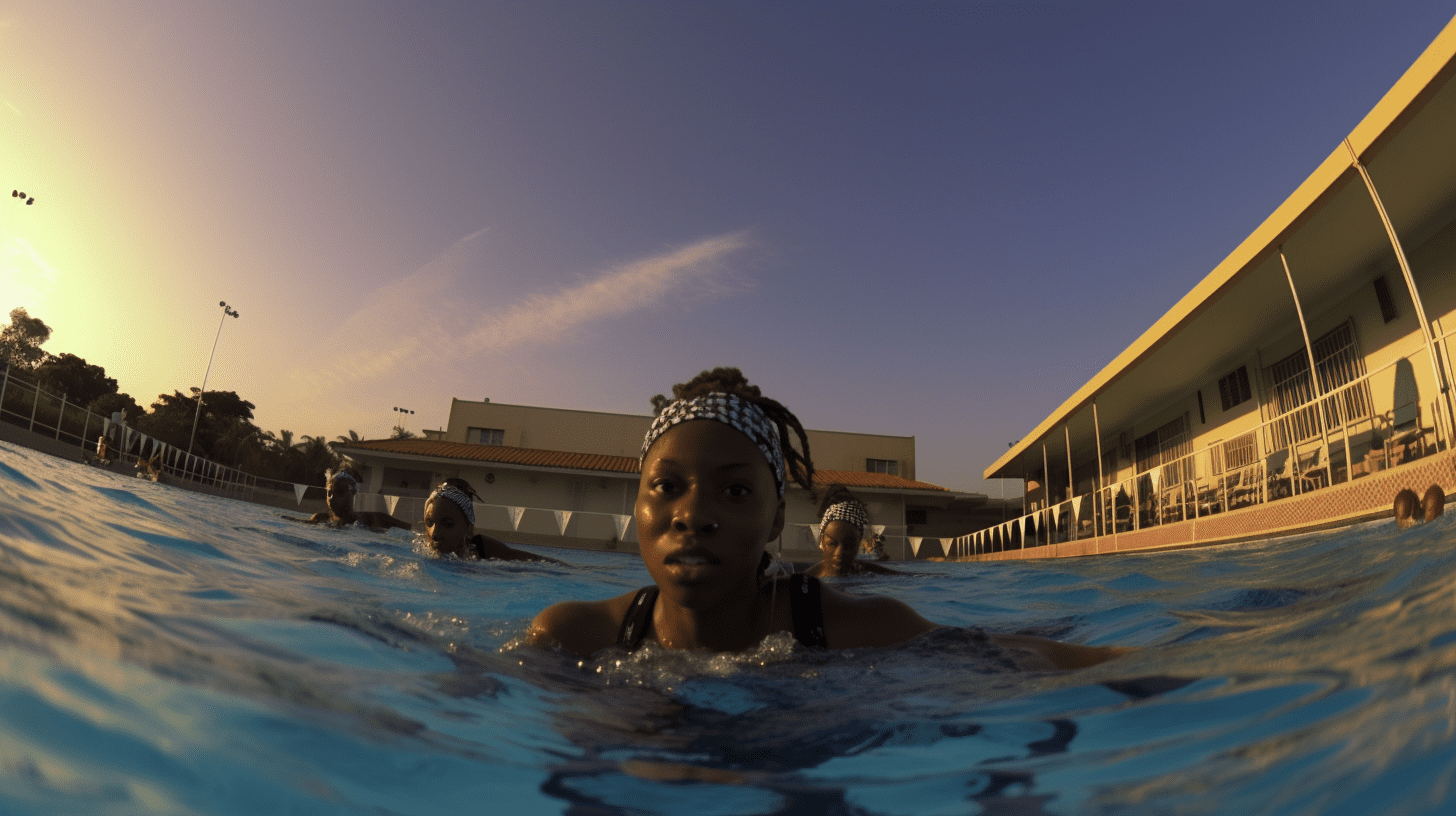- Home
- Wiki
- Learning Center
- Swimming Betting Guide: Making Waves in Sports Wagering Betting Guide
Swimming Betting Guide: Making Waves in Sports Wagering Betting Guide
- 1Swimming Betting
- 2Significance of World Rankings in Swimming Betting
- 3Various Swimming Techniques for Betting
- 4Types of Bets for Swimming Competitions
- 5Examples of Betting on Swimming
- 6How Handicapping Swimming Competitions Can Be Improved
- 7Some Potential Upsets to Look for When Betting on Swimming Competitions
- 8Pros and Cons of Betting on Swimming
- 9Conclusion
While especially prominent during the Summer Olympics, betting on swimming competitions has yet to garner widespread attention outside this quadrennial event. This is despite competitive swimming being one of the star attractions at the Olympics. The sport showcases a rich tapestry of events given the various lengths of races for each of the four recognised swimming strokes.

In addition to the traditional stroke-specific races, there are combined events such as medleys and team-based races like relays. While many betting platforms refresh their swimming odds predominantly during the Olympic years, there's a vast potential for more regular markets, considering the myriad of competitions throughout the calendar.
Key tournaments in the swimming world include the Swimming World Cup, European Championships, U.S. Open, and Duel in the Pool. The breadth and depth of these events indicate a potential goldmine for betting enthusiasts. However, the current betting landscape offers limited options for swimming enthusiasts. As the sport continues to evolve, there's hope that the public's interest will ignite a more vibrant betting scene for swimming shortly.
Different Types of Bets for Swimming Competitions
The National Swimming Society pioneered competitive swimming in the U.K. during the early 1800s. Holding its events in man-made indoor pools in London, this society played a crucial role in popularising swimming competitions. Their efforts saw such a surge in the sport's popularity that, by 1880, the Amateur Swimming Association was founded in England.
During these foundational years, the predominant strokes were the side and breaststroke. However, the landscape of competitive swimming changed in 1873 when John Trudgen introduced the front crawl to Britain. The new stroke, combined with a scissor kick or a flutter kick, added speed and renewed excitement to swimming races. Over time, adjustments to the front crawl evolved into what is now known as the freestyle stroke, widely recognised as the most efficient swimming technique. This evolution often entailed tweaking the balance of kicks to strokes.
A monumental moment in the annals of competitive swimming came during the 1972 Summer Olympics when Mark Spitz made history. He clinched seven gold medals, shattering every pre-existing record in the sport. Spitz's illustrious career saw him win nine Olympic gold medals, alongside silver and bronze medals. He also boasted five gold medals from the Pan American Games, 31 amateur championships, and eight college titles. In a short span from 1968 to 1972, his championship count surged, solidifying his legendary status.
However, the world of competitive swimming witnessed another prodigy who could draw parallels with the great Mark Spitz: Michael Phelps. Phelps boasts an astonishing 16 Olympic medals. He secured eight medals in the 2004 Athens Olympic Games - six gold and two bronze. Fast forward to the 2008 Beijing Olympics, and Phelps again left an indelible mark by winning eight gold medals, further cementing his place as one of the sport's all-time greats.

Swimming Betting
- Handicapping swimming competitions remains a nascent art, as the sport hasn't seen the kind of analytical scrutiny that mainstream sports enjoy. Consequently, reliable betting strategies specific to swimming are sparse. Nonetheless, based on principles of betting and insights from sports science publications, several guidelines can enhance prediction accuracy for swimming meets:
- Look Beyond Famous Names: Swimming gains mainstream attention mainly during the Summer Olympics, prompting many to bet on familiar names. This influx, often from casual bettors, skews the betting lines, making renowned swimmers disproportionately favoured. Thus, relying solely on household names can be a pitfall, offering poor value.
- Appreciate Swimmers' Specialties: Research swimmers' best events before placing bets. Olympic swimming ranges from the 50-meter freestyle sprint to the gruelling 1500-meter freestyle. Each requires distinct skills and physiologies. Rarely does one athlete excel across this spectrum. Understanding a swimmer's forte can assess their prospects against others in specific races.
- Stroke Trump's Distance: In swimming, the type of stroke often matters more than the race's distance. For instance, an athlete who excels in the 100-meter butterfly might not necessarily shine in the 100-meter backstroke. Recognise where a swimmer's stroke proficiency lies to gauge their potential advantage.
- Seek Value Over Favorites: Accumulate as much data as possible and visualise the race dynamics before zeroing in on betting odds. Consider multiple factors and scenarios. Then, estimate your odds for each swimmer based on your research. Remember, due to the niche nature of swimming betting, markets often disproportionately favour top names, making it hard to get good returns by backing favourites. Instead, scout for potential upsets, which can often offer better value.
Significance of World Rankings in Swimming Betting
A study by the Department of Physiology at the Australian Institute of Sport aimed to discern the correlation between a swimmer's world ranking and their performance at the Olympics.
Upon analysing Olympic swim times against world-ranking times, the study found that, on average, competitors swam marginally slower at the Olympics by 0.3%. However, there was a noteworthy exception: medal winners improved their performance times by 0.6%.
Furthermore, 87% of swimmers who clinched Olympic medals were already ranked in the world's top 10 before the games. The study's results suggest that for a swimmer ranked in the top 10 globally, an improvement of just 0.6% in their performance time — equivalent to a mere 0.13 seconds in events like the men’s 50-m freestyle — can considerably enhance their chances of securing an Olympic medal.
Exploring Swimming Betting Events
While it's impossible for bettors to predict with absolute certainty which swimmers will enhance their timings during the Olympics, they can employ an informed strategy based on swimmers' performances in the run-up to the event. To maximise betting accuracy, consider the following approach:
- Analyse Recent Performances: Focus on the times swimmers have posted in the months leading up to the Olympics. The closer these events are to the Olympics, the more indicative they might be of a swimmer's current form and potential Olympic performance.
- Aggregate Data: Compile all official race timings from competitions in the year preceding the Olympics. This comprehensive data set will clarify each swimmer's consistency, trends, and improvements.
- Benchmark Against World Rankings: Cross-reference the aggregated data with world rankings. A swimmer consistently clocking times close to or better than their world-ranking timings is likely in good form.
- Consider External Factors: While timings are crucial, they also factor in other variables like training conditions, health, potential injuries, and psychological preparedness. Sometimes, interviews, coach statements, or sports news can offer insights into these aspects.
- Look for Patterns: Some swimmers might consistently improve their times during high-stake competitions, indicating a psychological edge or a strategic approach to peaking at the right time.
- Factor in the Study's Findings: Remember the insights from the Australian Institute of Sport’s study — top 10 ranked swimmers who show even marginal improvements in their times leading up to the Olympics might have a heightened chance of medaling.
By employing a data-driven approach, bettors can increase their chances of making more informed decisions, reducing the unpredictability inherent in sports betting and capitalising on potential patterns and trends.
Various Swimming Techniques for Betting
Swimming offers diverse styles and competitions, each with unique challenges and techniques. Here are some of the most prominent:
Freestyle
Often referred to as the front crawl, freestyle is a versatile form of competitive swimming. Swimmers can use any style for their arm and leg movements without adhering to any specific stroke. It's characterised by its speed and the side-to-side rotation of the swimmer's body.
Backstroke
Essentially, the reverse of the front crawl, backstroke swimmers glide on their backs, facing upwards. While breathing in this position is easier, swimmers must be cautious as they can't see where they're heading. The stroke includes a flutter kick and a windmill arm motion.
Breaststroke
Recognised as one of the more intricate strokes, breaststroke involves a simultaneous movement of the arms in a half-circle motion in front of the body and a frog-like kick. With the swimmer's head predominantly above water, it lacks the streamlined efficiency of other strokes.
Butterfly
Arguably the most demanding, the butterfly involves a dolphin kick and windmill arm movement. The swimmer's chest and head rise in a rhythmic motion above the water, requiring intense coordination and stamina.Individual Medley (IM)
An actual test of a swimmer's versatility, the IM requires proficiency in all four strokes. Swimmers transition between butterfly, backstroke, breaststroke, and freestyle in that order, covering each stroke for a quarter of the race.
Relays
In a team event, relays involve four swimmers, each covering a specific portion of the race. A swimmer can only start once their preceding teammate touches the wall. Relay events can either focus on a single stroke, where all team members use the same stroke or be a medley. In medley relays, each swimmer uses one of the four strokes in the same order as the individual medley.
Whether it's the rhythmic coordination of the breaststroke or the sheer speed of freestyle, each swimming style offers a unique blend of technique, strength, and strategy, making swimming events captivating for both participants and spectators.

Types of Bets for Swimming Competitions
Head-to-Head Betting
Another popular betting format is the head-to-head bet, where two swimmers are pitted against each other, regardless of their overall result in the race. The bettor's job is determining which of the two will finish ahead of the other. This format provides a unique perspective as you're not necessarily focusing on the race's overall winner but rather a direct matchup.
Over/Under Betting
In over/under bets, bookmakers set a time for a particular race, and bettors wager whether the winning time will be over or under that set time. This type of bet can be especially intriguing when records are on the line or conditions might affect the swimmers' timings.
Exacta and Trifecta Betting
More advanced betting options include predicting the exact order of finish for the top two (Exacta) or top three (Trifecta) swimmers. The payouts for these wagers can be substantial due to the difficulty of predicting the precise outcomes.
Prop Bets
Proposition bets, or prop bets, are wagers on specific outcomes within a race which might not directly relate to the final result. Examples include betting on whether a world record will be broken during the event or if a specific swimmer will achieve a personal best time.
Futures Betting
This long-term wager involves predicting outcomes well before the event, such as which country will top the swimming medal table or who will be the overall best swimmer in a tournament.
Live Betting
With the advent of online betting, live betting has become increasingly popular. It allows bettors to place wagers in real-time as the action unfolds in the pool. Odds can change rapidly based on the race's progress, making it an exhilarating option for bettors.
Examples of Betting on Swimming
Outright Winner:
- Bet on Michael Phelps to win the 200m butterfly.
- Bet on Katie Ledecky to win the 800m freestyle.
Medal Betting:
- Bet on Caeleb Dressel to finish in the top 3 (win a medal) in the 100m freestyle.
- Bet on Sarah Sjöström to secure a medal in the 100m butterfly.
Head-to-Head:
- Bet on Adam Peaty to finish ahead of his main rival in the 100m breaststroke.
- Bet on Simone Manuel to out-swim her closest competitor in the 50m freestyle.
Relay Winner:
- Bet on the U.S. men's team to win the 4x100m freestyle relay.
- Bet on the Australian women's team to secure victory in the 4x200m freestyle relay.
Over/Under Time:
- Bet that the winning time of the men's 400m freestyle will be under 3:40.00.
- Bet the women's 200m backstroke winning time will be over 2:05.50.
Record Betting:
- Bet that a world record will be broken in the men's 50m freestyle during the event.
- Bet against any Olympic record shattered in the women's 200m individual medley.
Qualifying Bets:
- Bet on a specific swimmer to qualify for the finals of the 100m backstroke.
- Bet that a certain swimmer will stay within the preliminary heats in the 400m individual medley.
Exact Medal Count:
- Bet that a country like Japan will secure 4 gold medals in swimming at the Olympics.
- Bet that a specific swimmer will win 3 medals (of any type) during the World Championships.
Podium Finish:
- Bet on the exact order of the top three finishers in the women's 100m freestyle, predicting 1st, 2nd, and 3rd places.
Unique/Prop Bets:
- Bet on whether there will be a tie in any swimming event during a competition.
- Bet on a specific swimmer to win more gold medals than any other swimmer during a particular championship.
These are just some of the common types of swimming bets. The possibilities might expand based on the event, the sportsbook, and current sports trends.
How Handicapping Swimming Competitions Can Be Improved
Handicapping swimming competitions can be complex due to the myriad factors influencing an athlete's performance. However, improvements can be made in the handicapping process by integrating more data and understanding the nuanced aspects of the sport. Here are some ways to refine the process:
- Detailed Swimmer Profiles: Maintain an up-to-date profile for each swimmer that includes their best times, recent performance trends, training regimes, and any injuries or illnesses they've experienced.
- Historical Data Analysis: Analyze historical data to discern patterns. For instance, some swimmers might consistently improve their performance, leading to significant events, while others might peak early and then taper.
- Factor in External Conditions: Consider the venue's altitude, pool temperature, and other environmental conditions. Some swimmers perform better in certain conditions than others.
- Training Insights: Gain insights into a swimmer's training leading up to an event. Are they focusing on stamina, speed, or technique? This could influence their performance in different race lengths.
- Technological Assistance: Use video analysis tools to break down swimmers' techniques, starts, turns, and finishes. Minor adjustments in these areas can lead to significant time differences.
- Mental and Psychological Factors: Swimming, like all sports, has a psychological component. Understanding an athlete's mental resilience, past reactions under pressure, and general psychological state can offer predictive insights.
- Use Advanced Analytics: Employ machine learning and predictive modelling techniques to analyse vast datasets and pick out patterns the human eye might miss.
- Understand Team Dynamics for Relays: For relay races, it's essential to not only analyse individual performance but also the team's cohesion, changeover techniques, and strategies.
- Follow Swimmer Health and Lifestyle News: Any changes in a swimmer's personal life, health, or training regime can impact their performance. Regularly updated news feeds or alerts can help in staying informed.
- Analyse Competing Strategies: Understanding how swimmers strategise their races can offer insights. For example, some might start strong and try to maintain the lead, while others might conserve energy for a powerful finish.
- Swim Camps and Coaches: Information on who's training the swimmer and which swim camp they're a part of can give clues about their techniques, strengths, and potential strategies.
- Peer Feedback and Expert Opinions: Networking with other handicappers, former swimmers, or coaches can provide additional insights that might not be available through data alone.
- Continuous Learning and Adaptation: The world of sports is always evolving, with new techniques, training methods, and technologies emerging. Keeping oneself updated and being ready to adapt the handicapping methods accordingly is essential.
By integrating these strategies and always looking for new data sources and analysis techniques, the accuracy and reliability of handicapping swimming competitions can be significantly improved.

Some Potential Upsets to Look for When Betting on Swimming Competitions
Betting on potential upsets in swimming competitions can yield significant rewards, but it's essential to understand that predicting these outcomes involves a higher risk. Here are some scenarios and factors where upsets might be more likely:
- Historical Patterns: Sometimes, swimmers have a history of performing exceptionally well at certain venues or against specific competitors, even if they're not the favourites. Analysing past performances can provide clues.
- Recent Form: A swimmer showing consistent improvement in recent months might be poised to challenge a more established competitor.
- Injury Returns: A top swimmer returning from an injury might be undervalued because of the uncertainty surrounding their form post-injury. If they've had a solid recovery, they might outperform expectations.
- Training Changes: Swimmers who recently switched coaches or training programs might significantly improve due to new techniques or strategies.
- Young Talents: Emerging young swimmers can sometimes upset established stars. These newcomers might need more data, making them underrated in betting markets.
- External Factors: Factors like changes in water temperature, pool length (for non-standard pools), or altitude can affect performances. Some swimmers adapt better to these changes than others.
- Mental Factors: Swimmers who've recently had significant personal achievements or milestones might have a boosted morale that can translate into a better performance.
- Tapering Strategy: Swimmers taper their training leading up to major events to ensure they're at their peak. If a swimmer has perfected their tapering strategy, they might perform better than expected.
- Relay Events: In relay events, team dynamics play a crucial role. A well-coordinated team with good chemistry can sometimes outperform teams with individually stronger swimmers.
- Pressure: High-profile swimmers carry the weight of expectations, which can sometimes lead to underperformance, allowing for upsets.
- Preliminary Heats: Some top swimmers might not give their best in preliminary heats to conserve energy for finals, making themvulnerable to upsets.
- Event Scheduling: Swimmers competing in multiple events might be tired, especially if their races are scheduled close together.
- Equipment and Apparel: Issues like malfunctioning swimwear, goggles, or caps can impact a swimmer's performance.
While the above scenarios can increase the likelihood of upsets, it's essential to approach betting cautiously. Betting on upsets should be based on informed decisions and not just intuition. Always allocate your bankroll wisely, and remember that unpredictability makes sports betting exciting and risky.
Pros and Cons of Betting on Swimming
Like any other sports betting, betting on swimming comes with advantages and disadvantages. Here are some of the primary pros and cons of betting on swimming competitions:
Pros
- Less Popular: As swimming is a less mainstream sport in the betting world (outside of major events like the Olympics), there may be opportunities to exploit inefficiencies in the betting lines.
- Predictable Favorites: Historically, swimming has had dominant figures consistently performing well, making some outcomes more predictable than in other sports.
- Research Benefits: For dedicated fans who stay updated and do their research, there can be a more significant edge over bookmakers, especially in lesser-known events or categories.
- Diverse Betting Options: From medleys to relays to individual races and different strokes, there are numerous events to bet on during a single meet, providing various betting opportunities.
- Data Availability: Performance in swimming is primarily based on times, which are quantifiable and easily comparable. This makes statistical analysis relatively straightforward.
Cons
- Lower Liquidity: As swimming is less popular among bettors, there may be lower betting limits, especially for non-marquee events.
- Olympic Surge: The popularity surge during the Olympics can skew betting lines due to a flood of uninformed money, making it challenging to find value bets.
- Potential for Upsets: Like any sport, upsets always exist. An off day, illness, or minor injury can significantly impact a swimmer's performance.
- Limited Season: Major swimming events are less frequent than games in sports like football or basketball. This can limit consistent betting opportunities.
- Injury or Withdrawal Risks: Top swimmers sometimes drop out of lesser meets or events to focus on more significant competitions, which can disrupt anticipated outcomes.
- Lack of In-depth Coverage: Except for significant events, in-depth coverage and analysis might be problematic, making research more challenging for bettors.
When deciding to bet on swimming or any sport, weighing these pros and cons, conducting thorough research, and making informed decisions is essential. Remembering to bet responsibly and within one's means is vital.
Conclusion
After our comprehensive analysis of betting on swimming competitions, we at the VP-Bet editorial team believe this sport offers a unique opportunity for seasoned and novice bettors. While it might need consistent visibility and market depth of sports like football or basketball, swimming presents a fresh arena where keen research and analysis can genuinely pay off, especially given the sport's less mainstream status in the betting world.
The quantifiable nature of swimming, based primarily on timings, allows for a more data-driven approach, which can be a boon for those inclined towards statistical analysis. Major events, especially the Olympics, offer a massive surge in interest, but with it comes the challenge of finding genuine value amidst the hype.
However, with its challenges, swimming offers diverse betting options, from various strokes to medleys, relays, and more, ensuring that bettors have many choices during a single meet.
We advise potential bettors to approach swimming with a balanced view, leveraging the sport's predictability while being wary of its nuances. As always, responsible betting is paramount. Dive into the world of swimming betting, but ensure you're armed with knowledge, strategy, and a clear understanding of the risks and rewards.
FAQ
While betting on swimming is not as widespread as other sports, its popularity spikes during major events like the Olympics. Outside of these events, it remains a niche market, but it does offer opportunities for well-informed bettors.
The primary events for swimming betting include the Summer Olympics, World Championships, European Championships, and events like the U.S. Open and Duel in the Pool.
Common bets include winner betting, medal spot betting, head-to-head matchups, over/under on-time records, and relay outcomes. Some sportsbooks might offer prop bets, such as predicting exact medal counts or record-breakings.
While world rankings can give you a general idea of a swimmer's performance, analysing recent performance trends, physical conditions, and other relevant factors is crucial before placing a bet. Historical data shows that top-ranked swimmers can significantly improve their times during significant events.
Finding value often involves looking beyond the most famous names. Seasoned bettors usually look for potential upsets or underdog swimmers who have been showing consistent improvements leading up to the event.
Yes, swimming, especially during major events, can be unpredictable. Factors like race strategy, physical conditions, and even the psychological pressure of big meets can lead to unexpected outcomes. This is why it's essential to do thorough research and not rely solely on records or big names.
First, find a reputable sportsbook that offers betting options on swimming. Familiarise yourself with the available bet types and thoroughly research swimmers and upcoming events. Always start with smaller bets until you're more confident in your strategy, and remember, always bet responsibly.

Comments0